In the past few weeks three of my friends/colleagues/clients have had accidents involving equines. This is a subject very close to my heart since I have had bad accidents myself, one which almost took my life. I have begun to somewhat specialize in the area of helping people get back on their feet after such accidents, in addition to the other work I do. I really believe that because I came so close to death doing something I deeply love, it has made me able to help others in a very particular way.
The thing that we all recognize after the fact is that something wasn’t right about the situation. “I should’ve known when….” “My emotional state was such that I should’ve stayed home…” “I should have hung onto the reins…” But usually it involves multiple factors.
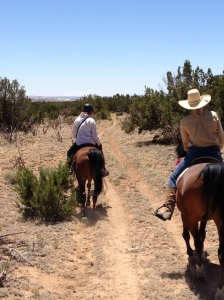 These accidents occurred with people who are well acquainted with horses and are cautious and careful around them. What it shows me is that there are variables that we work with – the variable of what is in ourselves that might affect the horse, and the variable of what is going on with the animal. And sometimes the accident happened at the speed of light and you can’t think what you might have done differently except not be in that place at that time. Usually when we look back we see the variables very clearly.
These accidents occurred with people who are well acquainted with horses and are cautious and careful around them. What it shows me is that there are variables that we work with – the variable of what is in ourselves that might affect the horse, and the variable of what is going on with the animal. And sometimes the accident happened at the speed of light and you can’t think what you might have done differently except not be in that place at that time. Usually when we look back we see the variables very clearly.
The one thing that people do so well (to their detriment) is override their gut feelings. This would be something the horse would consider “incongruency.” They live by their gut feelings, and we get on their backs and have all this incongruency and expect a smooth ride.
Some horses are very tuned out to the congruency and incongruency of people because they have lived with incongruency in their handlers for a long time. There is so much disconnection and incongruency in their riders and handlers, the horses become dull to them. That’s why just about “anyone” can get on them and think they’ve had a nice ride, when they have experienced absolutely no connection with the animal.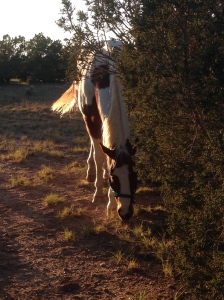
We humans are all subject to incongruency, probably because of our intellect and all the things in life that require something of us, such as work, children, primary love relationships, housing, bills, etc.
There are also situations that come up with horses we know very well – an 18-wheeler comes around the bend and blows its horn at you; the horse wheels and bolts, or any number of other scary things. It’s a freak occurrence, you do your best and hang on for dear life, or bail out.
I work with horses I don’t know sometimes. They don’t know me. I establish some kind of working connection when I go in to work with them, so they are aware of who I am and why I am there. There is more of an element of risk there because we don’t know each other, so I will take extra care and not put myself in any compromising position or expect a lot of them.
Having a horse-related injury is the most troubling to those of us who work with them day in and day out, because we love them and develop relationships with them. It kind of rocks the underpinning of everything we strive for, love and want to achieve. It often comes as a surprise to us in spite of all we know, that the horses can and will hurt us. It’s happening to us, not to someone else. But the truth of the matter is, the reason people get hurt is because of both the human and the horse.
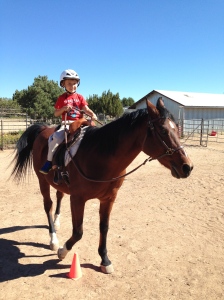 We are often told the animal we have just purchased is fully “trained.” What does that mean? Trained to do what? I like to do liberty training with any horse that comes to me in order to find any holes in that “training.” There is always something because what is important to one trainer may not be important to another one, but it could be extremely important to you.
We are often told the animal we have just purchased is fully “trained.” What does that mean? Trained to do what? I like to do liberty training with any horse that comes to me in order to find any holes in that “training.” There is always something because what is important to one trainer may not be important to another one, but it could be extremely important to you.
The horse may be trained in a submissive, dominant way, meaning dominance techniques have been used and he is looking for a way out of that. He may have been abused or not given clear boundaries. Horses who have been too spoiled – allowed to walk all over their owners – can also be dangerous unless given clear boundaries. I often find “trained” horses that appear really well trained but have no brakes. It really surprises me they have gotten through life so long like this.
I also like to do bodywork to determine if there is some stuck energy that the horse would like some help with. Sometimes one approach will work better than the other. One formerly abused horse I worked on did not respond as well to liberty work until I had done some bodywork on him first. An older schooling mare was so damaged she kicked and bit at people who tried to approach her. Those fight reflexes were defused with bodywork.
I’ve had situations where the horse’s response to bodywork is to suddenly jump – a reflexive action – and it might be on top of me if I am not prepared for it. So I keep my dimensions open and ready to move at a moment’s notice. I also position my body so that I am not in harm’s way.
The same is true in liberty coaching. A horse may respond quickly to something I am doing – such as whirl around and kick up his heels, so I maintain a safe distance from his body, especially those horses that I’m not familiar with. I do not “send” a horse that is too close to me. The images you see of people running close and free with horses or having a horse rearing in front of them are not ones to emulate – you could be hurt if you don’t maintain that safe distance between you.
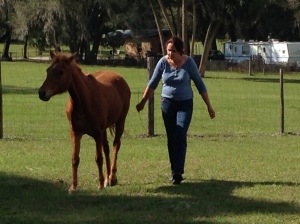
Horses look beautiful when they are romping and flowing wildly – and people are drawn to the dramatic. Let them romp a safe distance from you. It takes years to perfect some of the romping work you see with groups like Cavalia; it doesn’t happen over night. And those trainers live with their horses, become one with them, with a goal towards competition in groups of horses and people in beautiful, glamorous costumes.
Most of us are not there yet.
Safety is key in liberty clinics, always being aware of the horse’s energy and our own, and making sure we provide enough physical space between us and the horse, before we enter into a closer relationship. Participants are invited to work with these factors in mind.
In our upcoming clinic at Spirit Horse Ranch April 5-6, we will work on the first day with our energy and grounding, checking in with ourselves and seeing the difference in what our relationships are with the horses we work with. We will be able to determine what is coming from us and what is coming from the horse. This work, while seeming relatively simple, is really key to our safety around horses and hopefully will help to minimize horse related accidents for those who participate. It will be a wonderful experience for all of us.
(copyright: Susan Smith, OrthoHorse)
Services: Bodywork (Ortho-Bionomy for people, Equine Ortho-Bionomy): private sessions, tutorials, phone consultations, distance healing communication and gift certificates
Liberty Coaching: clinics, mini-clinics, workshops, private and semi-private sessions, tutorials, consultations: by appointment: 505.501.2478 or emailing susansmith@orthohorse.info Spring Lessons – semi-private, private and small group sessions. Scheduling now. Contact me for details.
If you want to host a clinic in your area, contact me to make arrangements. Prices will vary according to location and travel. susansmith@orthohorse.info 505-501-2478
I conducted a free Liberty Coaching Call on March 12. If you did not have a chance to listen, please send me your email and I’ll send you a copy.
On the schedule for 2014:
April 5-6 Spirit Horse Ranch Liberty Foundations Clinic, Jones, Oklahoma, Presented by coaches Ruella Yates and Susan Smith. Contact Ruella Yates ruella@libertyfoundations.com, (405-771-4274) or myself for registration and information. Space is limited. Private bodywork sessions and lessons are being scheduled now.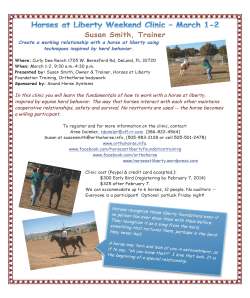
Check out this from Ruella Yates, my hostess and co-clinician at SHR in April – 10 Liberty Tips from Spirit Horse Ranch:
Ruella Yates, who is the marvel behind the HorseConscious Facebook page, has just released a brand new ebook called: “10 Liberty Tips From Spirit Horse Ranch” based upon her Liberty Foundations teachings.
What’s great about the book is that it’s packed full of really valuable advice yet very easy to consume and put into practice. I highly recommend you snag yourself a copy here:



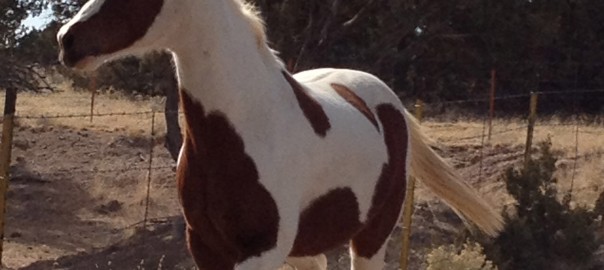
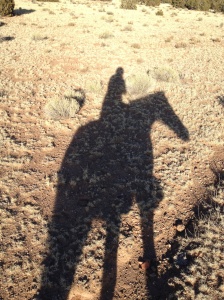
Susan, excellent information! We must always remain aware and look for things we may not be picking up on.
Thanks, Ann. Glad it’s helpful.
Outstanding info, Susan. With equestrian activities being rated as ‘most dangerous,’ your post is so important! Looking forward to welcoming you here for the April clinic!
Ruella Yates
Spirit Horse Ranch Liberty Foundations
Thanks, Ruella. So looking forward to our clinic!
Last summer my pony Joy took a flying leap over the tarp I was trying to get her to walk over and yanked me with her. I hit the ground and actually fractured my butt bone. It’s been 7 months and I still feel like I’m sitting on a bruise. So thank you for such a great article! =-)
Deb
Thank you for writing, Deb. When you fracture your pelvis it takes a very long time to heal. I still sometimes have pain in my right sit bone from a fall four years ago and ride with a sheepskin saddle cover to be more comfortable. You may want to explore finding an Ortho-Bionomy practitioner in your area to help speed your healing process along. http://www.ortho-bionomy.org/
An extremely important and very good article!!!
Thank you, Paul.